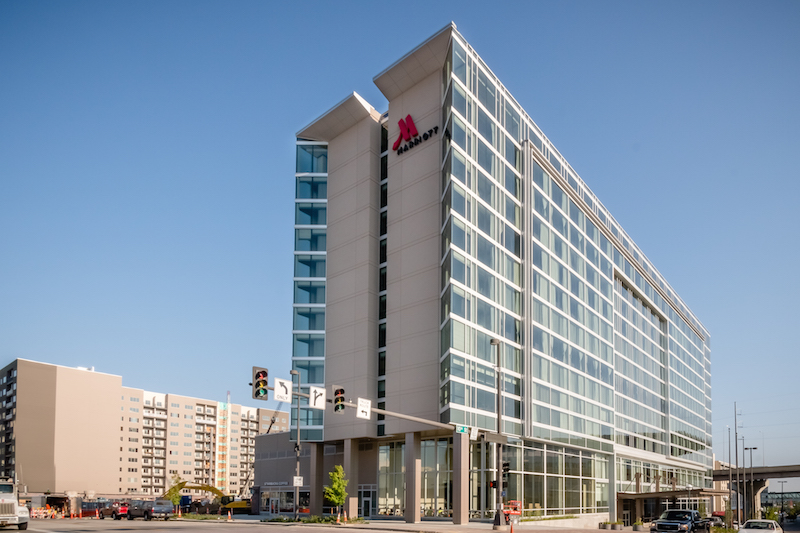Ken Martin, AIA, NCARB, has joined Leo A Daly to lead its Dallas office as Vice President and Managing Partner.
Most of Martin’s 25-plus-year career in design, planning, and management has focused on hospitality, which happens to be the Dallas office’s largest market. He joins Leo A Daly from DLR Group, where he was that firm’s hospitality and convention center expert. He reports to COO John Kraskiewicz.
Martin assumes his new post at a time when Leo A Daly has several large-scale hospitality-design projects in the works or just completed. These include the five-star 285-room Hotel Talisa in Vail, Colo.; the 582-room Ritz-Carlton Orlando Grande Lakes in Florida; and the 12-story 333-room Marriott Downtown Omaha in Nebraska, which opened last month as the first phase of that city’s entertainment Capitol District.
“Hospitality, I would argue, leads a lot of innovation,” says Martin in a video that Leo A Daly released to announce his hiring. “You cannot be reactive in this business.”
He praises his new employer as “one of the preeminent design firms in the hospitality industry,” and talks about the importance of sustainability and meeting guest expectations in hospitality design.
In a recent article he wrote for Hotel Business Review, Martin shared his thoughts about adaptive reuse as “a key piece of many [hotel] brands’ strategy,” and how authenticity in the redesign of existing buildings is “something of the Holy Grail.” On such projects, Martin said he asks the following questions to guide his teams’ designs: “What has that neighborhood been? Where is it going? Culturally, what are the drivers, and who are our local patrons going to be? What do they value? Who are the guests, why are they traveling to this city (or this neighborhood), and what are they looking for? That is to say: How do you integrate?”

Ken Martin was considering his professional legacy when, at 50, he switched firms. Image: Leo A Daly
Martin began his career as a museum exhibit designer for University of New Mexico, where he earned a bachelor’s degree in architecture. He spent nearly 27 years with DLR Group, rising to the level of Principal and National Hospitality Leader. One of the projects he was working on for DLR before he left was the renovation of the 16-story, 250-room Laylow Hotel by Marriott Autograph in Waikiki, Hawaii.
The 50-year-old Martin tells BD+C that several factors drove his decision to switch firms. For one thing, he and his wife are recent empty nesters, which gave them flexibility to relocate.
Martin was also giving more thought to his professional legacy. “I know there are is a finite number of projects I’ll get to do. So you start to ask yourself—blue sky—how can I make the biggest impact?”
He became aware that Leo A Daly was looking for a managing principal as Patricia Miller, its corporate director of hospitality, was moving into a global practice leader role for the firm. During the interview process, Martin was impressed with the projects that Leo A Daly was working on “that hint at a new level of design for the firm. This is a place where I can do signature work.”
He says that he brings a different approach to architectural programming and design, having been on the front end of DLR’s large conference center/hotel projects.
Leo A Daly is strong in the civic market. And there are other specialties across its 30 offices “that are begging to be infused with hospitality design and energy,” says Martin. The convention center/hotel sector is one of these; global healthcare and aviation are two others.
“Enlisting the strength of our hospitality teams in those projects and pursuits is a great avenue to doing great work,” says Martin.
Related Stories
Building Technology | Jun 18, 2024
Could ‘smart’ building facades heat and cool buildings?
A promising research project looks at the possibilities for thermoelectric systems to thermally condition buildings, writes Mahsa Farid Mohajer, Sustainable Building Analyst with Stantec.
University Buildings | Jun 18, 2024
UC Riverside’s new School of Medicine building supports team-based learning, showcases passive design strategies
The University of California, Riverside, School of Medicine has opened the 94,576-sf, five-floor Education Building II (EDII). Created by the design-build team of CO Architects and Hensel Phelps, the medical school’s new home supports team-based student learning, offers social spaces, and provides departmental offices for faculty and staff.
Healthcare Facilities | Jun 18, 2024
A healthcare simulation technology consultant can save time, money, and headaches
As the demand for skilled healthcare professionals continues to rise, healthcare simulation is playing an increasingly vital role in the skill development, compliance, and continuing education of the clinical workforce.
Mass Timber | Jun 17, 2024
British Columbia hospital features mass timber community hall
The Cowichan District Hospital Replacement Project in Duncan, British Columbia, features an expansive community hall featuring mass timber construction. The hall, designed to promote social interaction and connection to give patients, families, and staff a warm and welcoming environment, connects a Diagnostic and Treatment (“D&T”) Block and Inpatient Tower.
Concrete Technology | Jun 17, 2024
MIT researchers are working on a way to use concrete as an electric battery
Researchers at MIT have developed a concrete mixture that can store electrical energy. The researchers say the mixture of water, cement, and carbon black could be used for building foundations and street paving.
Codes and Standards | Jun 17, 2024
Federal government releases national definition of a zero emissions building
The U.S. Department of Energy has released a new national definition of a zero emissions building. The definition is intended to provide industry guidance to support new and existing commercial and residential buildings to move towards zero emissions across the entire building sector, DOE says.
Multifamily Housing | Jun 14, 2024
AEC inspections are the key to financially viable office to residential adaptive reuse projects
About a year ago our industry was abuzz with an idea that seemed like a one-shot miracle cure for both the shockingly high rate of office vacancies and the worsening housing shortage. The seemingly simple idea of converting empty office buildings to multifamily residential seemed like an easy and elegant solution. However, in the intervening months we’ve seen only a handful of these conversions, despite near universal enthusiasm for the concept.
Healthcare Facilities | Jun 13, 2024
Top 10 trends in the hospital facilities market
BD+C evaluated more than a dozen of the nation's most prominent hospital construction projects to identify trends that are driving hospital design and construction in the $67 billion healthcare sector. Here’s what we found.
Adaptive Reuse | Jun 13, 2024
4 ways to transform old buildings into modern assets
As cities grow, their office inventories remain largely stagnant. Yet despite changes to the market—including the impact of hybrid work—opportunities still exist. Enter: “Midlife Metamorphosis.”
Affordable Housing | Jun 12, 2024
Studio Libeskind designs 190 affordable housing apartments for seniors
In Brooklyn, New York, the recently opened Atrium at Sumner offers 132,418 sf of affordable housing for seniors. The $132 million project includes 190 apartments—132 of them available to senior households earning below or at 50% of the area median income and 57 units available to formerly homeless seniors.

















